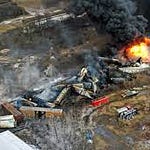Words From John
Happy Holidays n’at.
I’ll keep it short. This episode is all about the state of American rail. I traveled to Columbus, OH last week where the SMART (Sheet Metal, Air, Rail, Transportation) Union held a rally for railroaders.
Clyde Whitaker, a 22-year fourth-generation railroader and State Legislative Director for SMART, set me straight on what it’s like to work on the railroad right now. Short version: it’s bad.
The longer version is here in three forms: a thirteen-minute embedded audio track, a two-ish minute TikTok, and the full thirteen-minute interview transcript all the way at the bottom.
Before you dig in, a reminder. Trips to do these interviews only happen because of our paid subscribers. If you’re supporting The Holler right now, I really can’t thank you enough.
As far as I know, The Holler was the only media on-site doing interviews with workers. That’s the point of independent working-class supported media. Otherwise, these stories are never made.
If you want to ascend to a higher level of human experience and become a supporter of independent pro-working-class media, then please, read the next part…
Member-supported short video
The Holler is funded by people who want pro-working-class media to grow. Be a sustainer by subscribing for $5/mo ($60/yr) right now, please!
A 22-year railroader explains the state of rail. SMART rail rally, Columbus, OH.
Video Transcript:
John Russell 0:00
We're in Columbus, Ohio. We're going to talk to rail workers about the railroad situation. So let's go do that.
Clyde Whitaker 0:04
I'm a fourth-generation railroader. I've been here for 22 years. I've never seen it as tough.
John Russell 0:09
If the railroad shuts down, the whole country shuts down. We cannot live without it. It is so important that the United States Government prevents workers from going on strike without them getting involved first. So take a guess at how these essential workers are treated.
Clyde Whitaker 0:23
There's zero quality of life. One member called me last week, he can't take off for the funeral of his own mother. Our members are on call 24/7 365 days of the year. They don't have any sick days. If one of my members calls off sick, they're usually punished even if they have a doctor's excuse.
John Russell 0:44
Yeah. If you're the worker the entire country cannot live without, you're punished for going to a doctor, you have to miss your own mother's funeral for work, and forget about sick days because those are reserved for less important jobs - like senators.
Clyde Whitaker 0:56
I really think Congress though, missed the mark, especially the Senate. I mean, they get to work 108 days of the year. Unlimited sick time. And I got guys that are sick going to work and making other people sick.
John Russell 1:09
Running workers to the bone like this has a sleek corporate nickname, because of course, PSR or Precision Scheduled Railroading. They're cutting staff, making the trains longer, cutting safety, maintenance, and training, and making all the money like this while they can.
Clyde Whitaker 1:11
When I was hired on back in 2000, we had 26 weeks of training. Now you're getting six to eight weeks. They want to take the conductor off and go down to one-person crews. Canada's got a two-person crew after a train with a one-person crew wiped out an entire town. Another fell asleep at the throttle.
John Russell 1:43
Pay is going down, profits are going through the roof, and the billionaires that own rail companies are only getting richer.
Clyde Whitaker 1:48
I really think a lot of people are at their breaking point. And I've had guys from 20 years plus leave the industry.
John Russell 1:56
This is the corporate playbook. Run it fast and loose for all the short-term profit possible, forget workers, get the government to impose a contract before those workers can strike for themselves, and don't worry about a crash because if it happens, you can count on a taxpayer bailout.
Clyde Whitaker 2:11
These men and women work hard to move this country and the right thing needs to be done by them.
Transcript of the full 13-minute interview with Clyde Whitaker, State Legislative Director, SMART Transportation Division
John Russell 0:02
What's your name? What do you do? Why are we out here today?
Clyde Whitaker 0:11
My name is Clyde Whitaker. I'm with SMART Transportation Division, the Ohio state legislative board. I'm the Director and Chairman of that group.
And we push for safe working environment, and legislation to improve safety and quality of life. And today, we just settled a contract dispute that was on a national level. And we are trying to fight for a better quality of life. Our members are on call 24/7 365 days of the year, they don't have any sick days. If one of my members calls off sick, they're usually punished even if they have a doctor's excuse. This week, I've got phone calls from members that wanted to attend, but they're working. PSR (Precision Scheduled Railroading) cut the railroads to bare bones.
John Russell 1:04
Can you tell us a little bit about what that is and what that's been like for your members?
Clyde Whitaker 1:08
Yeah, PSR is Precision Schedule Railroading, which is anything short of that. Basically, it's a scheme to cut costs.
Right now, we have embargoes by various railroads in the country, and they can't handle the traffic, because they've ripped up all their infrastructure, and are just trying to run with bare bones.
Locomotives remain in storage. Our customers and the nation pay the price. Our citizens pay the price with higher cost of goods because we're not getting products to market. Like it should be.
John Russell 1:47
How has that made a difference in the lives of your members before that was implemented, and after?
Clyde Whitaker 1:52
PSR before, where normally a guy would have maybe one or two days off a week, you know, they're still on call. Yeah, the lifestyle is terrible, but it's made it much worse. Now I got guys working six, seven days a week.
For instance, one guy come home from a 12 hour run. He spends about an hour and a half, two hours in a taxi cab, he drives an hour home, spends about two three hours with the family sleeps for about eight hours. And he's right back to work.
John Russell 2:24
What you just told us is that the life that most railroad workers are living?
Clyde Whitaker 2:28
Right now, yes. There's zero quality of life. I've got members that can't even take time off for their family functions for anything.
When a member called me last week, he couldn't take off for a funeral for his own mother. That's not right. And the way the railroads are treating us, it's not good.
John Russell 2:49
And how are the railroads doing?
Clyde Whitaker 2:51
The railroads are making record profits. Even through the pandemic, their profits were through the roof.
John Russell 2:59
This fight has been brewing for a little bit. Can you give, you know, people watching a little bit of background of how we got to here today and what workers are really hoping... where they're hoping to go from here?
Clyde Whitaker 3:12
I think railroaders want a life. I mean, across all crafts, mostly the transportation engine guys, which are the engineers and conductors, they're the ones on call 24/7. Other crafts are too, but they normally have one or two days off and not away from home. So it's gotten a lot harder over the years. Like I said, I was expecting about 50-60 people, and I've got half that because they're all working now work and you can't get off.
Clyde Whitaker 3:45
And, you know, like, they can't even go to little Timmy's recital, you know? It's not right, what they're doing.
John Russell 3:54
Right. How do you feel about the contract, and in Congress using the 1920s era law to impose that?
Clyde Whitaker 4:07
I really can't talk much about the contract, because it's not my forte. I really think Congress, though, missed the mark, especially the Senate. They were empowered to do the right thing. I mean, who doesn't have sick days in the country? I mean, this is modern times.
John Russell 4:26
There are a lot of senators with sick days, right?
Clyde Whitaker 4:28
Yeah, I mean, they go to work 108 days of the year, unlimited sick time. And I got guys that are sick going to work making other people sick. And we wonder whether there's a manpower shortage. But the Congress and Senate, the Senate mostly, really missed the mark on this one.
John Russell 4:48
For the general public that might just be tuning in to this, what are the real issues that you want them to know about? What are the things you want them to know about what it's like to work on the railroad and to be in this fight?
Clyde Whitaker 5:01
Well, like I tell most legislators this job is one of the most dangerous jobs. I mean, we can haul upwards of 200-300 semi-trucks on one train. You know, we're hauling 20,000+ tons of Bracken crude oil. And we're making trains longer because of the PSR. It's more dangerous on engineers. It's more dangerous on the conductor because he's gotta get off and make repairs if need be. It's dangerous for the community because these long trains block road crossings in the communities, which prohibits emergency services from doing their job. And that's one big issue that PSR caused.
Clyde Whitaker 5:44
So, I would like to see the shorter train length law... block road crossings... right now, that's supposedly federal federally preempted. And right now, there's gonna be a challenge on that, because it's not right what the railroads done.
They're affecting the community in two different ways. One, the economy not shipping goods properly with these embargoes, and two, they're messing local businesses up because people can't get me on the train. Plus, you got kids that are crawling under and over the terrain, and they're getting hurt.
Plus, on top of that, it's like such a compound issue. We've got new guys coming onto the property, I got two of them out here today. Typically, when I hired on back in 2000, you had 26 weeks of training. Now you're getting six to eight weeks. That's not quality training, and conductors responsible for a life. And they want to take the conductor off and go down to one person crew. So tomorrow, we got a two person crew hearing to keep two people on.
Canada's got a two-person crew after Lac Megantic, after a train with a one-person crew wiped out an entire town. And the railroad’s argument is that there's no data to support less than two people on a train. Well, that's not right. You look at all the Amtrak incidents, and we've had was one person on the front end of the train. Chicane, New York, got derailed, killed people, he fell asleep at the throttle. And had that second person been up there, he could have kept that guy attentive. Or if he had the engineer’s license, they could have possibly swapped out. We'd still have those people alive. And like Lac Megantic. You know, fifty-something people, they'd still be alive today, had there been two people on that crew. And we don't need that here in our country, especially in the state of Ohio.
John Russell 7:50
We're outside of the Capitol today, you know, legislators here, legislators in Washington, what do you really want them to know?
Clyde Whitaker 7:58
I want them to do the right thing. We need a better quality of life for railroaders. Personally, I think the hours of service need to be adjusted. Our starts, basically you accumulate starts for each day at work. And the railroads are playing games with our guys, after you sit in a hotel for 24 hours. I mean, let's face it, you're still at work, you don't want to be in a hotel. They're restarting our guys starts, even after they're there 24 hours and five minutes. That's not right. They know what they're doing. They restart the rest. So that hurts the quality of life issue, where a guy's banking on being home for two days with his family, then going back to work for six or seven more days. So that needs work on the PSR motto, the STB really needs to step in.
John Russell 8:50
STB?
Clyde Whitaker 8:51
Yeah, Surface Transportation Board. They have the power to step in and stop this PSR madness. The customers are suffering as well.
John Russell 9:01
How much of this current situation would you say is because of PSR?
Clyde Whitaker 9:06
All of it. I mean, in the past since 2017, the lifestyle has just... it's terrible. And the customers they're not happy.
John Russell 9:16
So this has been the case since 2017?
Clyde Whitaker 9:18
Yes. It's Hunter Harrison. He came from one of the Canadian railroads, Canadian National, then NCP, then jumped to CSX. And after that, everybody hopped on board and started doing all the cutting and everything. And it's just progressively gotten worse. And right now it's at the boiling point. Guys are... enough is enough. That's where we're all at.
John Russell 9:41
Has PSR jacked up the profits of the railroads as it's cut everything else?
Clyde Whitaker 9:46
Oh, absolutely. They've made more profits in the past several years than the past 100 probably.
John Russell 9:53
When has it been this tough, looking back over decades?
Clyde Whitaker 9:58
I've been here for 22 years. I have never seen it as tough. I'm a fourth-generation railroader. I've never seen my grandparents, uncles, or any of them go through this stuff.
John Russell 10:12
And how sustainable is this? You know, how long can this really continue?
Clyde Whitaker 10:17
I really think a lot of people at their breaking point. I've been in my current position since May 1st, 2020, as State Director, and I've had guys from 20+ years leave the industry and some guys that were really great at their job. And, you know, they can't handle the lifestyle anymore, because it was just unsustainable, for a family.
John Russell 10:44
How much solidarity is there across all of the unions who are making the railroads run? I know that a couple of them, you know, voted to accept the contract more, the larger ones voted that down. Can you speak a little bit about that?
Clyde Whitaker 11:00
Well, that goes back to what I said earlier, you know, we're on call 24/7. Other crafts, they got different needs, you know, like their contract, obviously, they voted for it. Because they met everything they wanted. Most of them are on a regular schedule, right? So they can work with their managers, and get more time off. That's not across the board. For the most part, all 12 rail unions are in solidarity on the sick pay issue. And, you know, they support us, and we're gonna support them.
John Russell 11:39
If you had a chance to speak directly to the owners of the railroads, the folks who run them, what do you want them to know?
Clyde Whitaker 11:46
Well, that's a loaded question. And I'd be here all day. I just want them to do the right thing. These corporate business people, like the lady from UP got railroader of the year. Okay? I guarantee you, she's never been out on a train and followed my guy's footsteps. And the ladies out there.
These men and women, they work hard to move this country, and the right thing needs to be done by them. And that's, that's what I want. Treat us fair, treat us, right. Treat us with some dignity and respect. You know, it's not right to penalize somebody for calling off so they can go to their mother's funeral. That's not right. That's your mom. You know? I mean, stuff like that.
John Russell 12:32
Is there anything else we didn't cover today? Anything else you want to be asked about?
Clyde Whitaker 12:36
Oh, man. I'd be here all day. I really would. So mainly, you know, here in our state, we're pushing for a lot of safety issues. Next session at the beginning of the year, nationally our two-person crew is important, our sick time. And that's our main push right now. We're going to keep hammering until we get it.
John Russell 13:02
Good. Let's do your name, your title, how long you've been here, and where you're from.
Clyde Whitaker 13:07
Clyde Whitaker of Columbus, Ohio. I've been here 22 years with the rail industry. I've been a Union officer since 2002. And I was promoted to State Director from the local Chairman side back in 2020.










Share this post